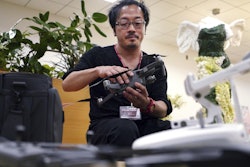BEIJING (AP) — China summoned the U.S. ambassador to deliver a strong protest against economic sanctions lodged over the purchase of Russian fighter jets and surface-to-air missile equipment.
The Defense Ministry said the U.S. had no right to interfere in Chinese military cooperation with Russia and warned Saturday that the failure to revoke the sanctions would lead to unspecified consequences.
The Foreign Ministry said in a statement that it had summoned Ambassador Terry Branstad. It gave no other details.
Washington says China's purchase of the weapons from Rosoboronexport, Russia's main arms exporter, violated a 2017 law intended to punish the government of Russian President Vladimir Putin for interfering in U.S. elections and other activities.
The action triggers a visa ban on China's Equipment Development Department and director Li Shangfu, forbids conducting transactions with the U.S. financial system and blocks all property and interests in property involving the country within U.S. jurisdiction.
The U.S. State Department said Li's department made a "significant transaction" involving the purchase of Su-35 combat aircraft in 2017 and S-400 surface-to-air missile system-related equipment.
Spokeswoman Heather Nauert said in a statement earlier that China's Equipment Development Department and director Li Shangfu made a "significant transaction" involving the purchase of Su-35 combat aircraft in 2017 and S-400 surface-to-air missile system-related equipment in 2018.
The sanctions were enacted "to further impose costs on the Russian government in response to its malign activities," she said. The U.S. will continue to "urge all countries to curtail relationships with Russia's defense and intelligence sectors, both of which are linked to malign activities worldwide," she added.
The Kremlin dismissed the sanctions as an "unfair" move to undercut Russia as a major arms exporter.
Kremlin spokesman Dmitry Peskov told reporters on Friday that Russia views the new set of sanctions as an attempt to undermine the competitiveness of Russian arms exports and vowed to reciprocate.
According to China's Defense Ministry, Sino-Russian military cooperation is normal between sovereign states, in line with international law, and the U.S. has no right to interfere.
"The U.S. approach is a blatant violation of the basic norms of international relations, a full manifestation of hegemonism, and a serious breach of the relations between the two countries and the two militaries," it said. "We demand that the U.S. immediately correct the mistake and revoke the so-called sanctions, otherwise the US must bear the consequences."






















